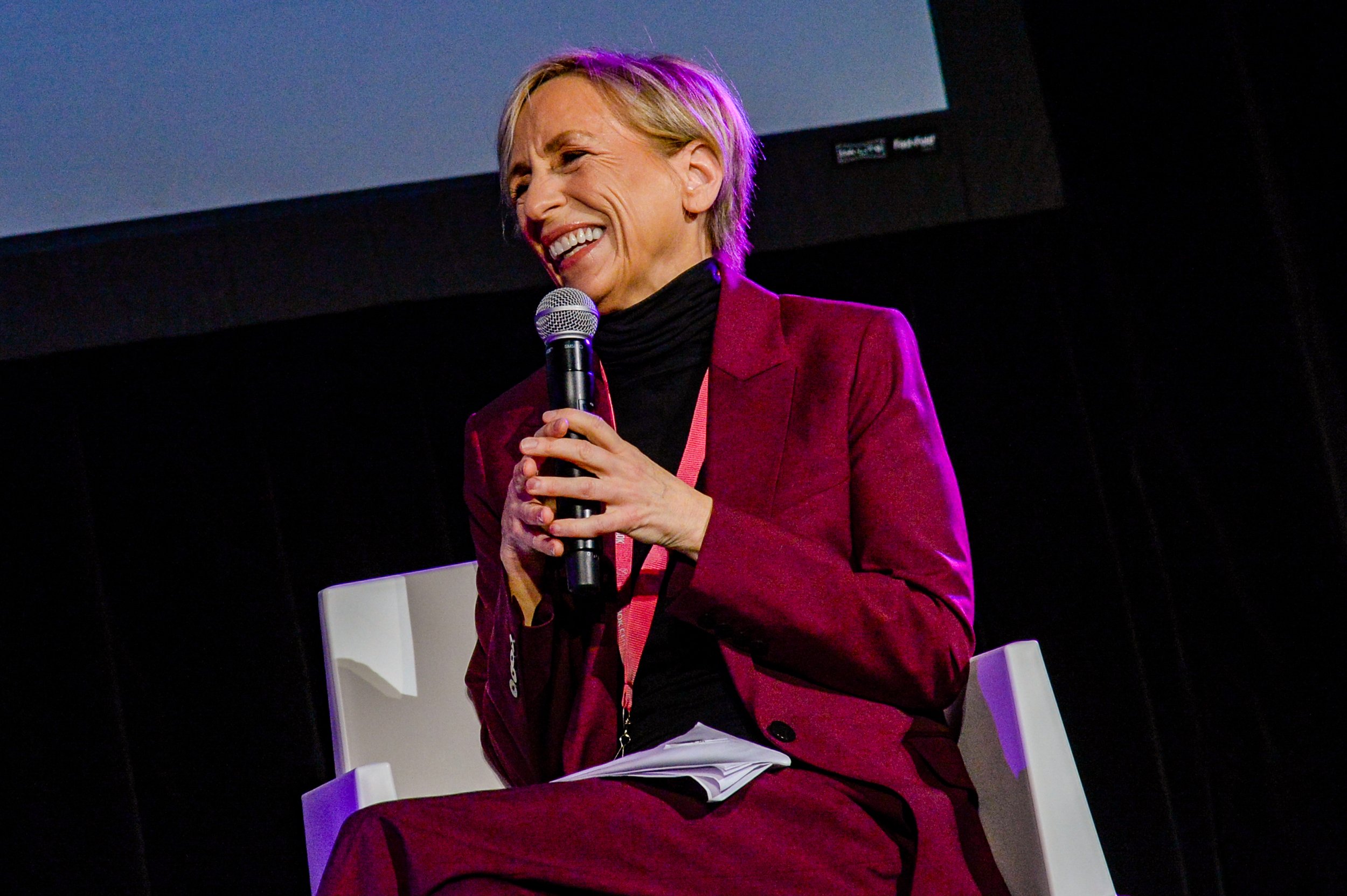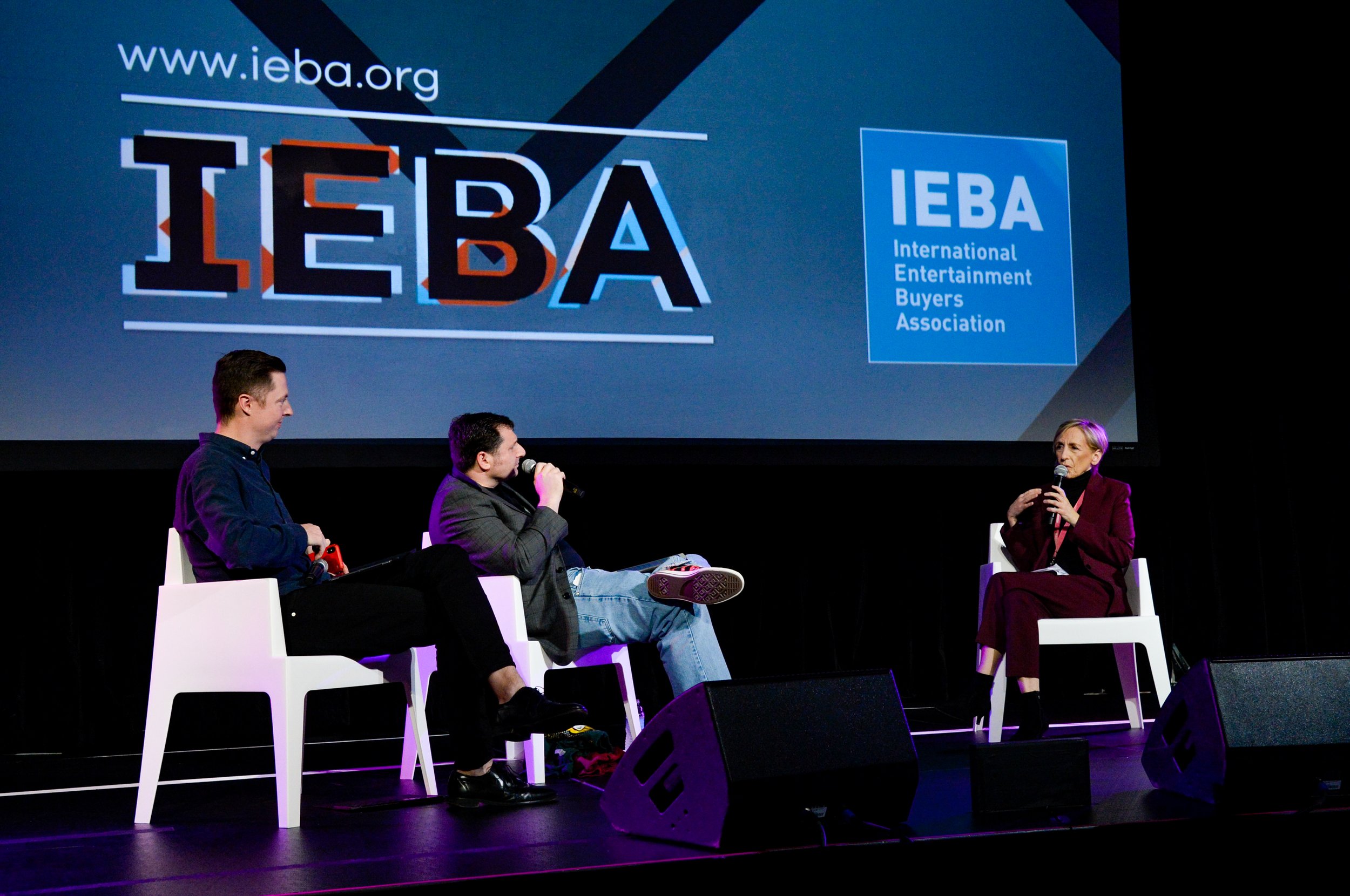Promoter 101 LIVE with Debra Rathwell
Interviewed by Dan Steinberg, Emporium Presents & Luke Pierce, Works Entertainment
The Promoter 101 guys returned to IEBA to spend time with AEG’s Debra Rathwell. Rathwell is SVP of Global Touring and founder of AEG’s New York office. One of the most influential executives in touring today, nothing in Rathwell’s childhood hints at the industry powerhouse she would become. She was raised in an isolated Canadian village of 300 citizens, where her father worked at the local hydro-electric power dam and her mother taught school. “We grew up very poor. We didn’t have any money for anything,” she recalled. “If you wanted money, you looked for bottles in the ditch. You took them to the store and you got five cents or ten cents. But we were able to run wild and use our imaginations.”
“I went to a one-room schoolhouse,” she said. At age 11-12, she was bused to another school. “Me and my brothers and sisters, we show up and everyone wants to know if we’re from the orphanage,” she said. “We were living in hand-me-downs from my cousin. We had no idea there was this other world out there. This was around 1964. I came home and I was apoplectic. I needed a mini skirt and stockings. I had been dropped into another universe and it was embarrassing. I think from that first incident I thought ‘You are never, ever, ever going to do that to me again.’ I was going to scrap my way out of this. You were never going to say I was from an orphanage. I was going to have clothes that mattered. I was going to hang out with girls from the top of the class. From that time, I never looked back. I just kept going.”
She always knew she would go to college. “Canada is very generous in finding a way for the young people to go to school,” she said. In her fourth year, Rathwell rented a room from the poet/singer Cyndela Whitney. Through this women’s grapevine of friends, Rathwell met the man who owned the local radio station, stereo & record stores, and a concert promotions company. His executive assistant was leaving after 13 years and Rathwell wanted the job. She wildly exaggerated her skillset but cinched the interview. “I think he hired me because I read The New York Times every Sunday. I think he thought that was the oddest thing,” she said. “He gave me a shot. I have great phone skills – that’s one thing I could actually do. I was good on the phone. Everything else I just made up on the fly and handled whatever problems there were.” She ended up in the concert division, co-promoting shows with the great touring impresarios Donald K. Donald and Michael Cohl. “My first show was Weather Report. My second show was the McGarrigle Sisters and I thought I’d died and gone to heaven. I knew I was going to do this for the rest of my life.”
When her boss moved back to Buffalo after his father died, Rathwell asked to be the concert manager. A conversation with the Bass Clef partners and Donald & Cohl determined that “a woman can be a concert manager” and Rathwell’s fate was sealed. “I was terrified but I did it. Those were the days when you had to write all of your expenses out, financially work out your deal, then call the agent and run down all your numbers from top to bottom … and have a personality on the phone and hope he was going to sell you [the date].”
At age 27, DKD lured Rathwell to his company with a salary, a car, and a Vice President title. “I remember driving to Montreal feeling like Mary Tyler Moore. And this was just the beginning,” she said. She spent her first six months sitting at a desk side-by-side with Donald, learning how to be a great promoter. “What he shared was invaluable,” she described. “He tried to explain to me why this is a better deal. We had to up our game and buy more shows. I had to understand more markets. He let me make mistakes. He let me be a promoter. If he hadn’t done all of that, I wouldn’t be the promoter I am today. It wasn’t until about age 38 that I thought, ‘I got it. You’re never getting me again. I am master of the universe now.’”
In the days of regional promoters, before internet warp-speed information, promoters were trusted experts in their respective markets. “You were respected. You didn’t have to worry about someone encroaching because most of the agents didn’t allow that to happen. You were the eyes & ears. There was nothing to go look up. There was no internet,” she recalled. “You could space shows out. But we had to do other shows like Moscow Circus and Olympic skaters to make a living.” It was in that search for programming that Rathwell found the musical stage production Tango Argentino, which became unexpected hit on Broadway. “The New York Times said ‘Run, don’t walk. Everybody must go.’ That show made so much money. It went everywhere around the world. It changed lives,” she said. “I got an apartment in New York – that’s how it changed my life. From ’85 to ’89, I spent a lot of time there. I used to flop on Frank Barcelona’s coach, while waiting for George Cavetto to finish work, and listen to old stories. I did lots of that stuff in New York and made a lot of friends I wouldn’t have if I’d just stayed in Montreal.”
After an incredible run in theater, she moved to back music. As DKD was selling the company to Cohl, Rathwell joined John Scher’s Metropolitan Entertainment in Mont Claire, New Jersey. Nine years of wishing for an opportunity in Manhattan ended when Scherer sold to Mitch Slater, then to Live Nation. Rathwell called Randy Phillips at AEG in Los Angeles and asked if he’d like to open a New York office. She hired eight of the terminated employees and opened on January 13, 2003. She said, “I had no shows. I had nothing. But I had faith from Randy.” Dennis Afra and Howard Rose supported her early efforts at AEG with Billy Joel & Elton John shows. “What’s so interesting about that is, if you fast-forward to the present, Dennis has given me Billy at Syracuse a couple of times and I’ve been working with him at Madison Square Garden on the residency, where we are into our seventh year. And here I am with Howard Rose – since 2017, we’ve been working on the three-year Farewell Yellow Brick Road tour with Elton John.”
Jeff Frasco and American Idol changed the course of Rathwell’s career. “I did the first big Idol tour in the year I opened the office. It paid all the bills. Jeff Fracso had made the rounds the year before to try and find someone to take this crazy show. Everybody turned it down. Remember, I come from Moscow Circus and Tango Argentino and all these crazy things. I thought it was really funny so I took it.” She became an expert in television-to-live with Dancing with the Stars, America’s Got Talent, and So You Think You Can Dance. Through Idol, she found Carrie Underwood, who’s been a client for 12 years. With Jeff Frasco, she also worked on High School Musical, Cheetah Girls, and Miley Cyrus/Hannah Montana. A seasoned pro and true believer in “kids’ stuff,” she seems to possess a sixth sense for what’s next and that includes taking JoJo Siwa from Nickelodeon to an arena headliner. “Credit for JoJo has to go to Adam Weiser. Adam has two daughters who needed these bows. That’s part of being a good promoter – if you see something, say something … react! So he made contact with Karen Sterling, the manager of JoJo, and we booked lunch. There was something about it that reminded me of Justin Bieber. We liked each other and we made a deal. We’re in arenas now – I’ve sold 35,000 tickets in New York. Now we’re going to the UK.”
When asked to look back over her career and cite favorite moments, Rathwell said, “I always get a little jumbled because I kinda love everybody. I can go back to Ottawa when I had Elvis Costello at Algonquin University and we had so many people in there. I had to get to the fire marshal – fire marshals play a big part in my life – and I had to run through Elvis Costello’s dressing room while he was dressing. I remember doing Police at the university in their student building and hanging out after. I remember drinking beer with U2 at a club in Ottawa and telling them they were going to be a really big band. My first Radiohead show was in a club in Albany. Wayne Forte was the agent and I was quibbling over the money. The greatest show I’ve ever been part of was Woodstock ’94. It was the most insane event. It was the most screwed up thing but it was spectacular.”
Dan and Luke closed the conversation by asking Rathwell about the keys to her success. Top of the list is the confidence to say “No, pass. It’s not for me” coupled with the wisdom to really & truly understand the deal and how to evaluate the downside. “One day you finally wake up and you understand all the things you need to do. Stop indulging in magical thinking,” she advised. “And that means ‘Oh, I can make this work.” No, you can’t. It’s part of knowing when to cut your losses. Call up, own up. Cut your best deal. Agents are mostly bluffing.”





